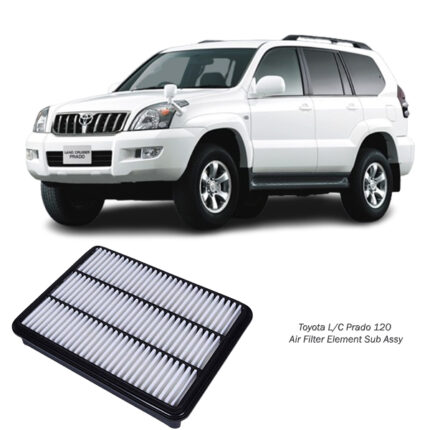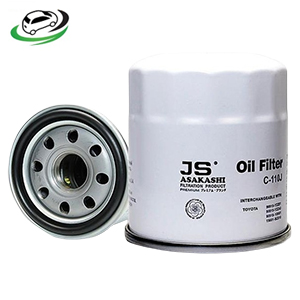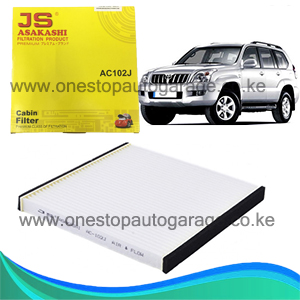-17%
Toyota Prado J120 Cabin Filter in Kenya.
Amidst the hustle and bustle of daily commuting, the cabin filter quietly performs a vital task in ensuring the comfort and well-being of passengers. This often-overlooked component plays a crucial role in maintaining clean air within the vehicle’s interior, filtering out pollutants, allergens, and contaminants. In this comprehensive guide, we will explore the importance of cabin filters in vehicle comfort and highlight the signs that indicate they may be worn out, requiring replacement for continued safety and comfort.
Importance of Cabin Filters:
- Air Quality Improvement: Cabin filters are designed to remove airborne particles, including dust, pollen, mold spores, and pollutants, from the air entering the vehicle’s interior. By trapping these contaminants, cabin filters contribute to improved air quality, creating a healthier environment for passengers, particularly those with respiratory conditions or allergies.
- Protection Against Odors: In addition to filtering out particles, cabin filters help neutralize unpleasant odors from outside sources, such as exhaust fumes, road dust, and industrial pollutants. This odor-absorbing capability enhances the overall comfort and enjoyment of the driving experience, allowing passengers to breathe clean, fresh air throughout their journey.
- HVAC System Efficiency: Cabin filters play a crucial role in maintaining the efficiency of the vehicle’s heating, ventilation, and air conditioning (HVAC) system. By preventing debris and contaminants from clogging the HVAC components, cabin filters ensure optimal airflow and performance. A clean cabin filter promotes efficient operation of the HVAC system, resulting in consistent temperature control and improved energy efficiency.
- Protecting Interior Components: Beyond air quality and comfort, cabin filters also help protect interior components of the vehicle. By filtering out dust and debris, cabin filters prevent these particles from accumulating on the dashboard, upholstery, and other surfaces, reducing the need for frequent cleaning and prolonging the lifespan of interior components.
Signs of Worn-Out Cabin Filters:
- Reduced Airflow: One of the primary signs of a worn-out cabin filter is reduced airflow from the vehicle’s vents. As the filter becomes clogged with dirt and debris, it restricts the passage of air through the HVAC system, leading to decreased airflow into the cabin. If you notice a noticeable decrease in airflow from the vents, it may indicate that the cabin filter needs to be replaced.
- Persistent Odors: A worn-out cabin filter may fail to effectively remove odors from the vehicle’s interior, resulting in persistent or unpleasant smells. If you notice lingering odors, despite attempts to air out the cabin or use air fresheners, it could be a sign that the cabin filter is saturated with contaminants and needs replacement to restore odor-neutralizing capabilities.
- Allergy Symptoms: For passengers with allergies or respiratory sensitivities, a worn-out cabin filter can exacerbate symptoms such as sneezing, coughing, or watery eyes. If allergy symptoms worsen while inside the vehicle, it may indicate that the cabin filter is no longer effectively filtering out allergens and contaminants from the air.
- Visible Dirt and Debris: Inspecting the cabin filter visually can provide insights into its condition. If the filter appears visibly dirty, clogged, or discolored, it is likely overdue for replacement. Visible dirt and debris on the filter’s surface indicate that it has reached its filtering capacity and is no longer effectively trapping contaminants.
- HVAC System Strain: A worn-out cabin filter can place strain on the vehicle’s HVAC system, leading to reduced efficiency and performance. If the HVAC system struggles to maintain consistent temperature control or exhibits unusual noises, such as rattling or whistling, it may be a result of restricted airflow caused by a clogged or worn-out cabin filter.
Conclusion:
Cabin filters are essential components of a vehicle’s HVAC system, ensuring clean air, odor control, and passenger comfort. Recognizing the signs of a worn-out cabin filter is crucial for maintaining optimal air quality and HVAC system performance. Regular inspections, attentive monitoring of airflow, and addressing any identified issues promptly can extend the lifespan of cabin filters and contribute to the overall comfort and well-being of passengers. By staying vigilant and responsive to these signs, drivers can uphold the integrity of their cabin filters, ensuring a healthier and more enjoyable driving experience for all occupants.



